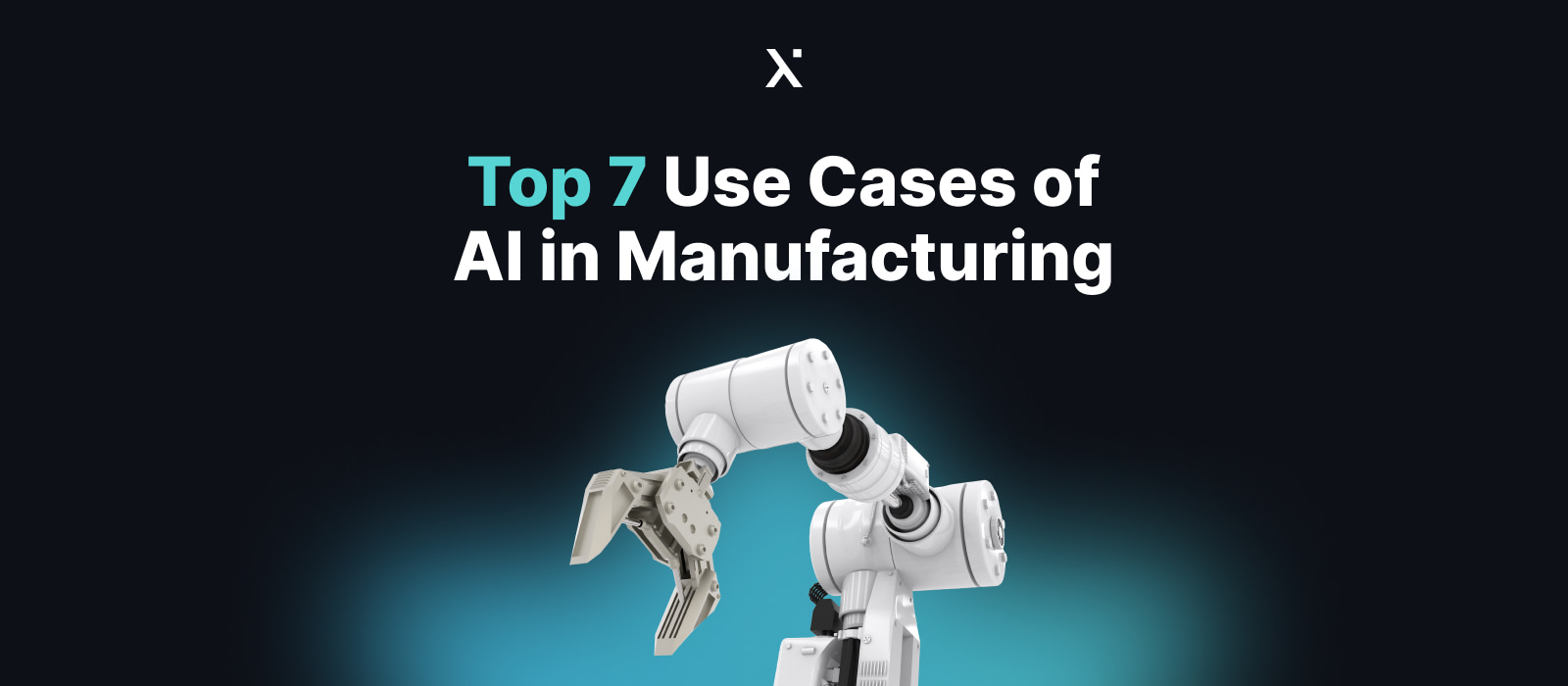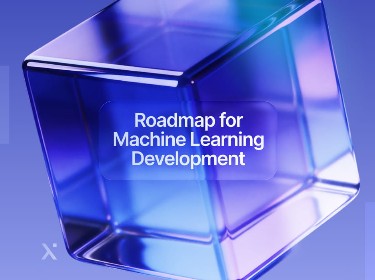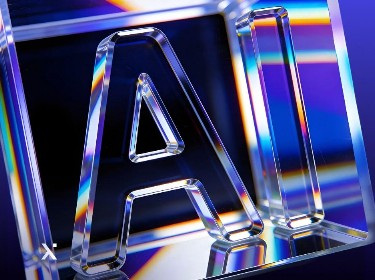AI in manufacturing has become a powerful and adaptable tool that is reshaping and boosting all sorts of processes across the industry. Now is the time to find out which ones.
The global AI in manufacturing market is projected to hit around $5.94 billion in 2024 and soar to over $230.95 billion by 2034. The growth signals that AI is becoming a vital part of the industry. From simplifying daily tasks to reinventing entire workflows, AI is opening up incredible new opportunities in manufacturing.
In this article, we will explore some of the most impactful ways to use AI in the manufacturing sector and spotlight standout use cases that are setting the stage for the future. Along the way, our professional AI development team will share insights into how these advancements are reshaping industry standards and creating exciting new possibilities.
5 key benefits of AI in manufacturing
![]()
AI is making waves in manufacturing and brings a fresh set of advantages that reach far beyond typical use cases and unlock game-changing benefits for businesses.
Let’s check them out.
Cost savings
AI enables manufacturers to cut costs by reducing waste, energy consumption, and labor requirements.
For example, predictive analytics solutions can spot potential equipment issues before they occur and help companies sidestep unexpected downtime and costly repairs.
Boosted efficiency
With AI and machine learning development in the mix, manufacturing processes can run faster and smoother than ever.
By taking care of repetitive and time-consuming tasks, AI frees up human workers for more strategic activities, which leads to faster production without compromising quality and keeps businesses competitive even during peak demands.
Data-backed decision making
AI can analyze real-time data from the production floor to spot trends, track key metrics, and even predict future needs. This gives business leaders a clear view of what is working and where improvements are needed, thus enabling data-driven decisions. With these insights, manufacturers can plan ahead and adapt more effectively to changes.
Better product quality
Advanced visual inspections running on computer vision solutions and artificial intelligence can detect even the tiniest defects that a human inspector might miss. Identifying these issues early helps manufacturers lower return rates and elevate product quality, which boosts customer satisfaction and strengthens trust in the brand.
Safer work environments
When it comes to safety, artificial intelligence in manufacturing takes things up a notch. Smart sensors and wearable tech monitor working conditions and flag hazards before they become incidents, thereby protecting employees and reducing accidents. This makes for a healthier workplace where safety is a priority, which can lead to a more satisfied and engaged workforce.
Explore how our blockchain development team created a Hyperledger Fabric-based system to monitor, analyze, and manage the entire radioactive materials supply chain
Top 7 AI use cases in manufacturing
![]()
AI in manufacturing examples are abundant. The technology helps manufacturers battle their biggest challenges and supercharge their workflows.
Now, let’s take a look at the most outstanding AI use cases in manufacturing.
1. Predictive maintenance for equipment
AI-powered predictive maintenance systems help manufacturers stay ahead of breakdowns by analyzing real-time data from machine sensors.
Instead of waiting for equipment to fail, AI models pick up on subtle signs of wear, like unusual vibrations, leaks, defects, faulty connections, overloads, or temperature spikes, and alert maintenance teams to schedule repairs before issues escalate.
Moreover, according to PwC, AI-enabled predictive maintenance could reduce maintenance costs by up to 30% and cut unplanned downtime by 45%, which offers both cost savings and operational stability.
2. Generative design in product development
Generative AI, a newer development in artificial intelligence, is upending the product design phase. It enables manufacturers to generate multiple design options based on factors like material strength and cost limits. Engineers can input their design goals, and AI algorithms will then create, simulate, and highlight the most efficient variations.
What’s more, according to McKinsey, using generative AI in manufacturing speeds up the design process and allows manufacturers to experiment and refine concepts without extensive manual prototyping, ultimately reducing costs and improving product quality.
3. Supply chain optimization
An AI-driven supply chain development keeps manufacturers agile and responsive to customer demands.
From predicting shifts in demand to choosing the fastest shipping routes, AI and big data solutions make it possible to track almost every aspect of the supply chain in real time. Plus, AI algorithms can analyze past orders, market trends, and even weather patterns to ensure that supplies arrive exactly when they are needed.
Recently, SAP introduced new AI-driven innovations that give manufacturers precise, real-time insights to help them stay resilient through supply chain disruptions. Companies like SMA Solar Technology AG are already seeing impressive results, including a 15% increase in workforce productivity and a 10% reduction in planning costs and inventory
4. Inventory management
AI-powered inventory management systems are transforming how manufacturers handle their stock by accurately tracking items and forecasting future needs.
With machine learning at play, these systems analyze sales data, seasonal trends, and supplier timelines to optimize stock levels. As a result, manufacturers can avoid overstocking or running out of essential materials, all while reducing storage costs and minimizing waste.
To illustrate the effectiveness of AI in warehouse and inventory management, we’d like to share a real-life case study from our portfolio. In our hypermarket warehouse automation project, we implemented an AI-powered order-picking system that helped the client boost their operations. As a result, we reduced the average time for order collection from 25 minutes to just 7 minutes, which demonstrates the tangible benefits of integrating AI into manufacturing processes.
5. Automated quality inspection
Thanks to AI and computer vision, in particular, quality inspection in manufacturing is getting sharper and more efficient than ever. Smart systems rely on high-resolution cameras to scan each product on the assembly line and manage to detect even the tiniest defects in real time whether it is a scratch or an assembly error.
For instance, BMW utilizes innovative technologies like Car2X and AIQX to elevate quality inspection. During production, these AI systems carefully analyze each vehicle and make sure that any small imperfections are caught right away, which enhances overall quality and boosts customer satisfaction.
Here, it is also worth noting that the BMW Group Plant Regensburg is pioneering the industry as the first car manufacturing facility to fully adopt a digitalized and automated process for inspecting, processing, and marking painted vehicle surfaces in mass production. With AI-controlled robots in action, each vehicle is treated individually, which helps maintain top-notch quality standards at every stage of production.
Discover how PixelPlex developed this web and mobile IoT solution for BMW dealership showroom services
6. Smart demand forecasting
Using AI in manufacturing helps companies make better decisions about how many specific products, like electronics or seasonal clothing, to produce and when.
AI lets manufacturers look into data from customer behavior, past sales, social media trends, and even weather forecasts and gain a comprehensive understanding of what their customers really need and want. With these insights, companies can adjust production to avoid overstocking or running short, thus creating a more efficient operation that better serves their customers.
A great example of this in action is Nestlé. They use an AI-powered concept generation engine that transforms insights from social media into fresh product ideas. By analyzing consumer feedback and market trends, the AI suggests innovative concepts that Nestlé’s team reviews. From there, prototypes are created and tested with real consumers, which helps determine whether the product should hit the market.
7. Energy management and sustainability tracking
The World Economic Forum notes that traditional manufacturing often leads to resource and labor exploitation. Fortunately, AI alongside other cutting-edge technologies and solutions like the tokenization of carbon credits can allow for the creation of innovative and sustainable product and service models.
AI helps reduce material waste by identifying inefficiencies before production begins and improves sourcing and energy management. It also drives energy transition strategies by analyzing data to optimize spending across the supply chain.
On top of this, using AI in manufacturing and Internet of Things development services can increase consumer awareness by visualizing product impacts and waste streams. Thus, by moving away from the old “buy cheap, make more, sell high” mindset, AI enables the development of ethical business models that reduce exploitation.
How about we team up to bring your AI project to life?
As we have explored the top 7 use cases of AI in manufacturing, it is crystal clear that the technology is transforming the industry for the better. From predictive maintenance to smarter supply chains, AI empowers manufacturers to operate more efficiently than ever before.
At PixelPlex, we are dedicated to providing top-notch artificial intelligence development services. Our expertise spans natural language processing, deep learning, computer vision, and machine learning. We are genuinely passionate about empowering businesses across various industries to harness the incredible potential of AI.
To see how we have helped different companies achieve their goals through AI, feel free to explore our AI portfolio and delve into the tech details of the impactful AI solutions that our professionals have delivered.
Ready to take the next step? Get in touch with us now and let’s elevate your processes to new heights.




